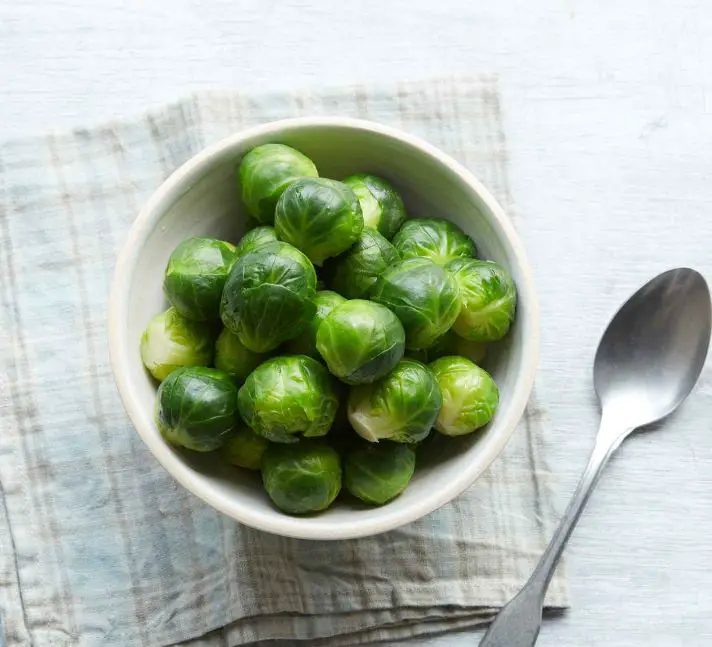You may have been forced to eat them as a child, but Brussels sprouts are actually a delicious and extremely healthy vegetable.
These little green balls are packed with vitamins, minerals, and antioxidants that can do everything from improving your bone health to boosting your immune system.
In fact, just one cup of Brussels sprouts provides more than a quarter of your daily recommended intake of iron and vitamins.
Keep reading to learn more about the amazing health benefits of Brussels sprouts!
Contents
Do Brussels Sprouts Have Iron?
Yes, brussels sprouts are a good source of iron. One cup of cooked Brussels sprouts contains about 3 mg of iron, which is approximately 17% of the daily recommended value.

Iron is an important mineral that helps to transport oxygen in the blood and is essential for proper cell function.
What Are The Health Benefits of Brussels Sprouts?
1. Bone Health:
Brussels sprouts are an excellent source of vitamin K, which is essential for bone health. Vitamin K helps to prevent bone loss by keeping calcium in the bones where it belongs.
This makes Brussels sprouts a great food to eat if you’re concerned about osteoporosis or other bone-related conditions.
2. Cancer Prevention
Brussels sprouts contain several compounds that have been shown to reduce the risk of cancer. One of these compounds, sulforaphane, has been shown to kill cancer cells without harming healthy cells.
Additionally, the antioxidants in Brussels sprouts can help to protect DNA from damage that can lead to cancer.
3. Digestive Health
Brussels sprouts are a good source of fiber, which is essential for digestive health. Fiber helps to keep things moving along in the digestive tract and can also help to reduce the risk of constipation and other digestive issues.
4. Boosts Immunity
The vitamins and minerals in Brussels sprouts make them a great food for boosting immunity. Vitamin C is especially important for immunity, and just one cup of Brussels sprouts contains over 100% of the daily recommended intake!
Which Vegetables Are High in Iron?
In addition to Brussels sprouts, other good sources of iron include:
- Spinach
- Kale
- Collards
- Swiss chard
- Mustard greens
- Turnip greens
- Beet greens
- Broccoli raab
So, if you’re looking to up your iron intake, make sure to incorporate these leafy greens into your diet. Sautéed, steamed, or raw, there are endless ways to enjoy them!
Do Brussel Sprouts Inhibit Iron Absorption?
NO, Brussels sprouts actually promote iron absorption. They are high in vitamin C, which is essential for the absorption of non-heme iron (the type of iron found in plant foods).
So, if you’re looking to increase your iron intake, make sure to include Brussels sprouts in your diet. Whether you enjoy them roasted, sautéed, or raw, there are endless ways to enjoy these little veggies!
Which Has More Iron Broccoli or Brussel Sprouts?
Broccoli is a nutrient-rich vegetable that is packed with vitamins and minerals, including iron. One cup of cooked broccoli contains 3 mg of iron, which is about 17% of the recommended daily intake for adults.
Broccoli is also a good source of fiber, vitamin C, and potassium.
Brussels sprouts are another vegetable that is high in nutrients, including iron. One cup of cooked Brussels sprouts contains 2 mg of iron, which is about 11% of the recommended daily intake for adults.
Brussels sprouts are also a good source of fiber, vitamin C, and folate.
So, which has more iron: broccoli or brussels sprouts? The answer is broccoli!
Both vegetables are excellent sources of iron and other nutrients, but broccoli contains slightly more iron than Brussels sprouts.
When it comes to getting our daily dose of iron, we should definitely include broccoli and Brussels sprouts in our diets!
How Can I Raise My Iron Levels Quickly?
There are a few things you can do to raise your iron levels quickly:
- Eat iron-rich foods: Make sure to include plenty of leafy green vegetables, legumes, nuts, and seeds in your diet.
- Take an iron supplement: If you’re not getting enough iron from food, consider taking an iron supplement.
- Get more vitamin C: Vitamin C helps the body absorb iron, so make sure to eat plenty of vitamin C-rich foods or take a supplement.
- Avoid food and drinks that inhibit iron absorption: Coffee, tea, and calcium can inhibit iron absorption, so it’s best to avoid them when you’re trying to raise your iron levels.
If you suspect that you have low iron levels, talk to your doctor. They can order a blood test to check your iron levels and make sure you’re getting enough of this important mineral.
Why You Shouldn’t Eat Brussel Sprouts?
Brussels sprouts are a nutrient-rich vegetable that is packed with vitamins and minerals, including iron. One cup of cooked Brussels sprouts contains 2 mg of iron, which is about 11% of the recommended daily intake for adults. Brussels sprouts are also a good source of fiber, vitamin C, and folate.
So, why shouldn’t you eat Brussels sprouts? There are a few things to consider before adding this vegetable to your diet.
- First, Brussels sprouts contain goitrogens, which are substances that can interfere with thyroid function. If you have an underlying thyroid condition, you may want to avoid Brussels sprouts.
- Second, Brussels sprouts can also cause gas and bloating. If you’re sensitive to these effects, you may want to avoid Brussels sprouts.
- Finally, some people may be allergic to Brussels sprouts. If you experience any adverse effects after eating Brussels sprouts, talk to your doctor.
Overall, Brussels sprouts are a healthy vegetable that is packed with nutrients. However, there are a few things to consider before adding them to your diet. If you have any concerns, talk to your doctor before eating Brussels sprouts.
What Happens if You Eat Too Many Brussel Sprouts?
If you eat too many Brussels sprouts, you may experience some side effects, such as gas and bloating.
Additionally, Brussels sprouts contain goitrogens, which are substances that can interfere with thyroid function. If you have an underlying thyroid condition, you may want to avoid Brussels sprouts.
Finally, some people may be allergic to Brussels sprouts. If you experience any adverse effects after eating Brussels sprouts, talk to your doctor.
Overall, Brussels sprouts are a healthy vegetable that is packed with nutrients. However, there are a few things to consider before adding them to your diet. If you have any concerns, talk to your doctor before eating Brussels sprouts.
How Long Does It Take To Get Iron Levels Up?
It typically takes around 3-6 months to increase your iron levels. However, it may take longer if you have a more severe case of iron deficiency.
If you’re looking to increase your iron levels quickly, you can take an iron supplement. However, it’s best to talk to your doctor before starting any new supplement, as too much iron can be harmful.
In addition to supplements, there are a few things you can do to increase your iron levels:
- Eat more leafy green vegetables: Leafy green vegetables are a good source of iron. Try incorporating more spinach, kale, and Swiss chard into your diet.
- Eat more iron-rich foods: Other good sources of iron include red meat, poultry, beans, and nuts.
- Add a vitamin C supplement: Vitamin C helps the body absorb iron, so adding a vitamin C supplement can help increase your iron levels.
What Drink Is High in Iron?
There are a few drinks that are high in iron.
- Beetroot juice: Beetroot juice is a good source of iron and other nutrients, such as magnesium and potassium.
- Green smoothies: Green smoothies made with spinach or other leafy greens can be high in iron.
- Fortified orange juice: Orange juice that has been fortified with iron is another good option.
- Red wine: Red wine can also be a good source of iron.
If you’re looking to increase your iron levels, talk to your doctor about the best way to do so. They may recommend taking an iron supplement or eating more foods that are high in iron.
Are Eggs High in Iron?
Yes, eggs are a good source of iron. One large egg contains around 1 mg of iron. Additionally, eggs are a good source of other nutrients, such as protein and vitamin D.
If you’re looking to increase your iron intake, you can try eating more iron-rich foods, such as red meat, poultry, beans, and nuts.
You can also take an iron supplement or talk to your doctor about receiving an iron infusion.
Are Brussel Sprouts Good for Anemia?
Brussels sprouts may help improve the symptoms of anemia. Anemia is a condition where there is a lack of red blood cells in the body. This can lead to fatigue, pale skin, and shortness of breath.
Brussels sprouts are a good source of iron, which is necessary for the production of red blood cells.
Additionally, Brussels sprouts are a good source of other nutrients, such as vitamin C and folate.
If you’re looking to improve the symptoms of anemia, talk to your doctor about incorporating more iron-rich foods into your diet. They may also recommend taking an iron supplement or receiving an iron infusion.
Conclusion:
As you can see, there are many good reasons to start incorporating Brussels sprouts into your diet.
They’re not just for kids anymore! Whether you eat them roasted, sauteed, or raw, Brussels sprouts are a delicious and nutritious way to improve your overall health.
But if you have any health conditions which put you in a doubt about eating brussels sprouts or not, it’s better to consult your doctor about it.
Give them a try today! Thanks for reading.
Amazon and the Amazon logo are trademarks of Amazon.com, Inc, or its affiliates.

